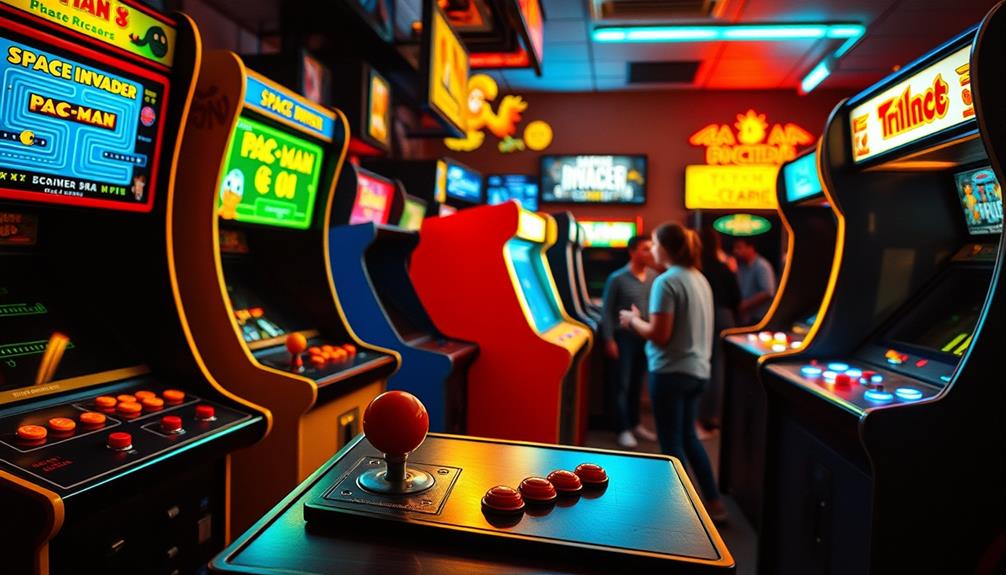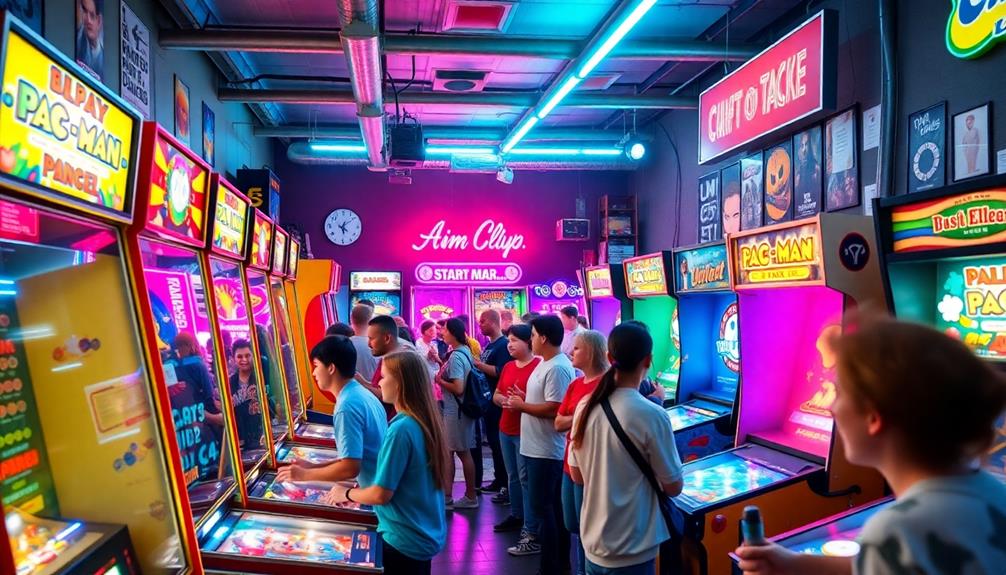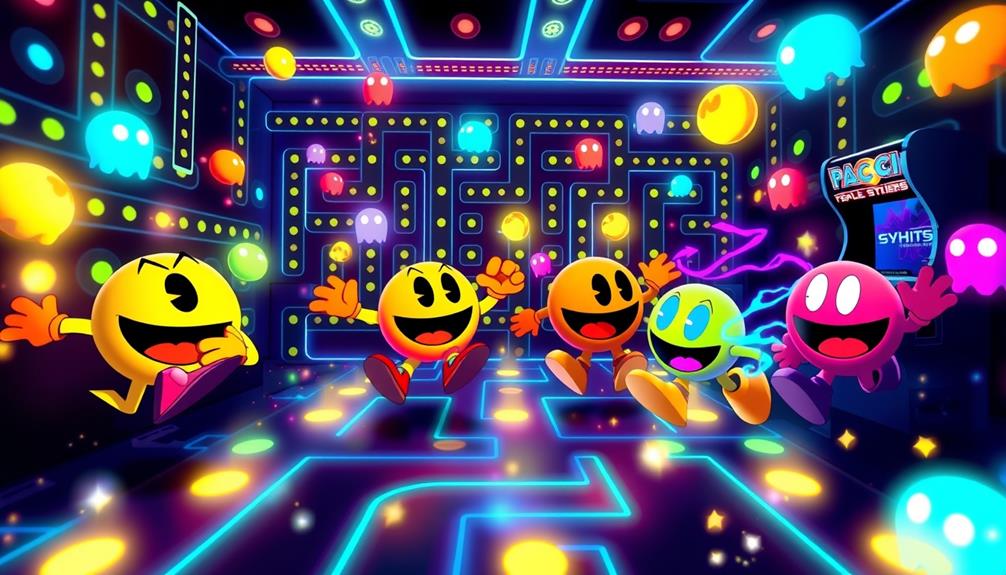Arcade games can be quite expensive, typically ranging from $2,500 to $7,000 for various reasons. Firstly, the **production costs** are high due to the specialized, durable components and smaller quantities used. Next, **licensing fees** for popular franchises can significantly drive up prices. The **market demand** for rare titles due to nostalgia and collector interest is another factor. Furthermore, the **maintenance and repair costs** of owning an arcade machine add to the overall expense. If you’re intrigued about why these machines are in such high demand, keep exploring the topic. The specialized skills needed to maintain and repair arcade games also contribute to their high cost. Moreover, the challenge of **mastering difficult arcade game levels** and achieving high scores makes owning these machines even more appealing, increasing their market value. In conclusion, the satisfaction and enjoyment that come from owning and playing arcade games make them a valuable investment for enthusiasts and collectors, despite their high prices. The **challenging nature of arcade games** adds to their allure, as players are willing to pay more for the thrill of conquering tough levels and achieving top scores. The exclusivity and scarcity of certain arcade titles only add to the demand and, in turn, the cost of ownership. Overall, the investment in arcade games, though substantial, is worth it for those who appreciate the fun and excitement they bring. Follow the link to learn more about why arcade games are so highly valued.
Key Takeaways
- High production costs stem from lower manufacturing volumes and the use of specialized, durable materials for heavy usage.
- Licensing fees for popular franchises significantly inflate retail prices and squeeze manufacturers' profit margins.
- The niche market results in limited availability, allowing sellers to charge more due to high demand and scarcity.
- Nostalgia and historical significance increase collector interest, driving up prices for classic arcade games.
- Maintenance and repair costs can accumulate quickly, adding to the overall expense of owning arcade machines.
Understanding High Production Costs
When you step up to an arcade machine, you're not just paying for a game—you're also covering the high production costs that come with it. Unlike home gaming consoles, arcade machines are produced in much lower volumes, which drives up their production costs. This scarcity means that manufacturers need to set higher prices to guarantee profitability. Furthermore, the history of arcade games also plays a role in their production costs. Many of these machines are built with a level of craftsmanship and attention to detail that is not typically found in home gaming consoles. This commitment to quality, combined with the limited production, contributes to the higher prices of arcade machines. Nevertheless, for many fans, the unique experience and nostalgia associated with playing on an arcade machine makes it worth the investment.
Additionally, the best arcade machines often incorporate modern technology integration, which further increases production expenses.
The technology behind arcade machines is advanced, featuring high-quality graphics that require sophisticated design and engineering. This level of innovation isn't cheap.
Additionally, the specialized components and durable materials used in these machines are built to withstand heavy wear in high-traffic environments, further contributing to their cost.
Since arcade machines face intense use, their design prioritizes durability, which adds to the overall expense. With a limited market for these machines, the costs must be spread across fewer sales, making each unit more expensive.
All these factors combine to create a pricing structure that reflects the high production costs you encounter when you enjoy your time at the arcade.
The Role of Licensing Fees

Not only do high production costs impact arcade game prices, but licensing fees also play a significant role. When manufacturers want to use popular franchises, they often face substantial licensing fees that inflate production costs. This financial burden can be similar to the challenges faced by those considering investments in volatile markets, such as Bitcoin IRA volatility.
Here's how licensing fees affect arcade game prices:
- Intellectual Property Rights: Manufacturers must pay original creators for the right to use their characters and themes, which drives up costs.
- Profitability Concerns: These financial obligations can squeeze manufacturers' profit margins, forcing them to adjust their pricing models.
- Franchise Popularity: The more popular a franchise, the higher the licensing costs, which translates to elevated retail prices for you, the consumer.
- Market Limitations: In a limited market, where fewer buyers exist, manufacturers often set higher prices to recover their costs, further impacting what you pay.
Specialized Components and Materials

Arcade game manufacturers invest heavily in specialized components and materials to guarantee their products can withstand the rigors of public use. The cabinets are built from durable materials that endure heavy wear, assuring longevity in environments filled with enthusiastic players. This focus on durability contributes to the higher production costs associated with arcade games.
Additionally, the importance of budget management in operating an arcade is vital, as owners must balance initial investments with ongoing expenses.
Furthermore, the hardware components used in these machines are specifically engineered for high-traffic use. Unlike standard consumer electronics, these specialized components are designed to handle frequent interactions, making them more expensive.
Custom design and labor-intensive manufacturing processes further escalate costs, as specialized parts often carry a premium price tag.
If you're considering arcade machines, be prepared for customization options that can drive component prices up even more. Buyers often want unique specifications, and these custom features reflect the individual tastes and needs of arcade owners.
Ultimately, the reliability of these specialized components is essential for operational efficiency in arcades, justifying the higher price point associated with arcade games. Investing in quality materials and parts guarantees that players enjoy a seamless gaming experience, keeping them coming back for more.
Market Demand and Limited Availability

When you look at arcade games, you'll notice that their niche market means fewer buyers, which often leads to higher prices.
The scarcity of rare titles only fuels this trend, as collectors compete fiercely for machines that are hard to find.
For instance, the best rated pinball machines of 2024 highlight how advanced technology and design can also impact pricing.
As demand surges, it's clear that the combination of limited availability and collector enthusiasm is driving prices up.
Niche Market Targeting
The allure of niche market targeting in the arcade game sector stems from its unique blend of demand and limited availability. When you consider the factors at play, it's clear why prices are elevated. For instance, the nostalgia factor can be compared to the way celebrity relationships capture public interest, driving collectors to seek out beloved titles from their past.
Here are four key reasons:
- Limited Buyers: Fewer potential buyers mean sellers can charge more to guarantee profitability.
- Aging Titles: Many arcade games are older and harder to find, which increases demand among collectors looking for specific titles.
- Licensing Fees: Popular franchises come with hefty licensing fees, driving up the retail prices of arcade games and reflecting their market demand.
- Nostalgia Factor: The resurgence of interest in classic arcade games has spurred a competitive collector market, making rare titles even more valuable.
This niche market creates an environment where dedicated enthusiasts are willing to pay a premium for unique arcade games.
Vendors can maintain higher prices without worrying about inventory turnover, as the appeal of these games often transcends mere gameplay. In this way, niche market targeting considerably influences the pricing landscape of arcade games, making them more costly but highly sought-after.
Scarcity of Rare Titles
Rare arcade titles have become prized possessions for collectors, driving up their market value considerably. The scarcity of these unique machines stems from limited production runs, especially from the late 1970s to mid-1990s, making them highly sought after by enthusiasts. As nostalgia for classic games grows, many original arcade machines have become increasingly rare due to damages and conversions. This limited availability creates a competitive market that inflates prices.
Take a look at some examples of rare arcade titles:
| Title | Estimated Value |
|---|---|
| "Asteroids" (1979) | $5,000 |
| "Donkey Kong" (1981) | $7,500 |
| "Street Fighter II" (1991) | $10,000 |
| "Galaga" (1981) | $4,000 |
Collectors often hold onto these rare titles for extended periods, further decreasing the supply in the market. The combination of nostalgia and limited availability leads to heightened demand, making these machines even more desirable. In this way, the scarcity of rare arcade titles continues to push their prices into the stratosphere.
Collector Competition Rising
Collector competition for vintage arcade games has surged, fueled by a growing passion among enthusiasts and the limited availability of sought-after titles. You might be surprised to see how this competition has transformed the market, driving prices for popular arcade cabinets into the stratosphere. Here's what you need to know:
- Rarity Drives Demand: Many classic arcade machines, especially those in mint condition or rare variants, command prices well above their original retail cost. The nutritional benefits of these vintage games can be likened to the rich history and cultural significance they hold, making them even more desirable.
- Limited Supply: Damage and conversions to new titles have drastically reduced the number of available arcade cabinets, intensifying competition.
- Collectors Hoard: Serious collectors are holding onto rare titles longer, meaning fewer machines are up for grabs, which further inflates prices.
- Nostalgia Factor: Media portrayals and nostalgia for iconic games from the late 1970s to mid-1990s have amplified collector interest, creating a competitive landscape.
As you explore this world, be prepared for fierce bidding wars and escalating prices. The collector competition is rising, and securing that coveted arcade cabinet might take more than just luck!
Maintenance and Repair Expenses

When you own arcade machines, you'll quickly realize that repair costs can add up fast, especially for complex systems like pinball machines.
The mechanics of pinball machines involve a combination of mechanical and electronic components, which can require specialized knowledge for repairs.
Regular maintenance is essential, and neglecting it can lead to even higher expenses down the line.
Understanding the frequency of these maintenance needs will help you budget effectively and keep your machines running smoothly, especially when considering the importance of early machines that may have unique repair challenges.
Repair Cost Considerations
Owning an arcade machine can be a thrilling experience, but you should be prepared for the potential repair costs that come with it. The expenses can stack up quickly, especially if you're dealing with older models like pinball machines. Many enthusiasts also invest in quality cleaning tools, such as best vacuums for dust removal in 2024, to maintain their machines.
Here are some key considerations:
- Specialized Expertise: Repairing older machines often requires skilled technicians familiar with complex electronics, which can drive up labor costs.
- Replacement Parts: The high demand for rare components can make some parts extremely expensive, further adding to your overall repair costs.
- Undisclosed Issues: If you buy a used machine, there may be hidden problems that you'll discover later, leading to unexpected repair expenses.
- Ongoing Maintenance: Regular upkeep is essential for peak performance, and these ongoing maintenance costs should be factored into your overall investment.
In some cases, you might find that repairing an older arcade machine is more costly than purchasing a new or refurbished unit.
Understanding these repair cost considerations will help you make informed decisions and guarantee a rewarding arcade experience.
Maintenance Frequency Requirements
Maintaining your arcade machine is essential for guaranteeing its longevity and performance. The maintenance frequency requirements can vary, but regular checkups and tune-ups are vital to keep your games running smoothly. Many service agreements include these checkups, helping you avoid costly breakdowns.
Additionally, understanding the AI cybersecurity jobs landscape can inform you about the importance of safeguarding your arcade machines from potential cyber threats as technology integrates more into gaming.
You'll also need to stay on top of software updates. These updates aren't just recommended; they're often necessary to keep your arcade games current and functional, contributing to your overall maintenance costs.
When it comes to repairs, be prepared for potential expenses, especially with complex machines like pinball. These often require specialized expertise in electronics, making repairs more complicated and costly.
Additionally, the high demand for replacement parts can greatly impact your maintenance budget. Even if you buy a used arcade machine, you might encounter undisclosed repair issues that lead to unexpected maintenance costs after your purchase.
Nostalgia and Collectibility Trends

Nostalgia often plays a crucial role in driving the collectibility trends of classic arcade games, particularly those from the late 1970s to mid-1990s. As you reminisce about those arcade days, you might find yourself drawn to the rising prices of these beloved titles.
This connection to the past can enhance problem-solving abilities through diverse perspectives, as engaging with these classic games brings back memories and encourages exploration of new ideas and experiences curiosity and happiness.
Here are four key factors contributing to this trend:
- Cultural Significance: Games like Atari's Tempest and Midway's Mortal Kombat not only evoke memories but also represent a pivotal era in gaming history.
- Limited Availability: As collectors vie for high-demand titles, the scarcity of certain machines pushes their market prices higher.
- Investment Potential: Unique and rare arcade machines, especially in mint condition, can appreciate greatly over time, making them attractive investments.
- Media Influence: Popular media representations and cultural phenomena surrounding these games amplify interest, further driving up demand.
In this climate of heightened nostalgia and collectibility, it's no surprise that arcade game prices soar.
As you navigate the world of collecting, you'll find that the emotional connection to these games fuels their value and desirability.
Comparing Arcade to Home Gaming

How do arcade games stack up against home gaming systems regarding cost and experience? When you consider the initial investment, arcade games can set you back anywhere from $2,500 to $7,000, while a decent home gaming setup might only cost a few hundred dollars.
Despite this price gap, home gaming systems often provide comparable gameplay experiences, but arcade games stand out with unique interactive features that immerse you in the action.
However, it's crucial to factor in ongoing costs. Arcade machines require regular maintenance and repairs to keep them running smoothly, which isn't usually an issue for home gaming systems. This adds to the long-term expenses of owning arcade games.
Production volume plays a role too. Arcades produce machines in lower quantities, leading to higher production costs reflected in retail prices. In contrast, home gaming systems benefit from economies of scale, keeping prices lower.
With the rise of online gaming and the convenience of home gaming, arcades are finding it tough to compete.
Ultimately, while arcade games may offer a unique experience, the financial commitment is considerably higher compared to home gaming.
Frequently Asked Questions
How Much Does the Average Arcade Game Cost?
The average arcade game costs between $2,500 and $7,000. Popular titles can reach even higher, while vintage machines typically range from $500 to $4,000, depending on their condition and collectibility.
Are Arcade Games Still Profitable?
Imagine planting seeds in a garden; with care, they bloom. Yes, arcade games can still flourish financially. Their charm and nostalgia draw players, ensuring consistent traffic that nurtures profitability for owners willing to invest wisely.
Why Are Games so Expensive Nowadays?
You'll notice games are expensive nowadays due to advanced technology, high production costs, and licensing fees. Limited demand and the need for ongoing maintenance also drive prices up, making them less accessible for casual players.
What Arcade Game Grossed the Most Money?
Imagine tossing your quarters into a machine—Pac-Man's the champ, grossing about $2.5 billion since 1980. Street Fighter II follows, raking in over $1.5 billion, both shaping gaming culture and the arcade scene.
Conclusion
In the world of arcade games, the price tag often feels like a ticket to a nostalgic carnival ride. With high production costs, licensing fees, and specialized materials, it's no wonder these gems can be pricey. As demand climbs and fewer machines grace our game rooms, the cost keeps soaring. But remember, every quarter you drop is a step into a vibrant past, making each game not just a play, but a cherished memory waiting to be relived.








